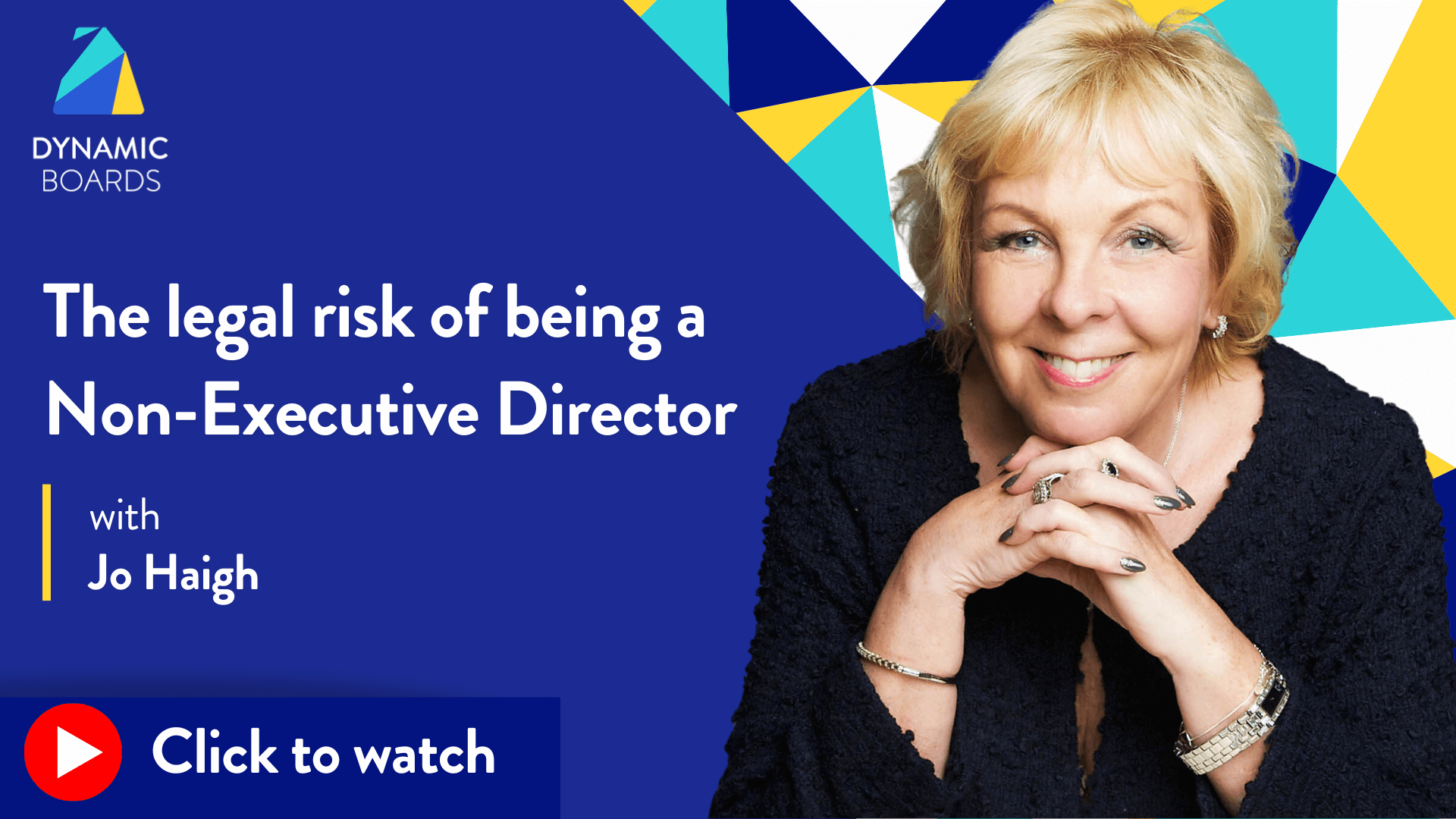
“With great power comes great liability,” says Jo Haigh, Chairman and founder of FDS Director Services, a published author and current NED for five organisations, including a publicly listed company. It is a stark reminder of the legal exposure for any individual providing independent oversight as a Non-Executive Director, (or Trustees that behave like Directors).
In the first blog of this series exploring the legal risks faced by NEDs, we look at the requirements for becoming a Non-Executive Director in the UK and the legal duties associated with taking on a board role.
This series is based on a talk that Haigh did on this topic for the Dynamic Boards NED Community, which you can watch in full here:
So, who can become a Non-Executive Director in the UK?
The basic requirements are that you must be a human individual, at least 16 years of age and have the mental capacity to fulfil your duties. There are certain restricted categories that can prevent you from becoming a NED like undischarged bankruptcies, previous disqualification of being a Company Director, and convictions for serious criminal offences such as money laundering or bribery.
While this is technically all the criteria you must meet to become a Non-Executive Director, before you take on any NED role, it’s important that you are fully aware of your legal liabilities as a company director on a UK board.
What are The 7 Duties of a Company Director in the UK?
The Companies Act 2006 lays out the duties of company directors (both Executive and Non-Executive) in the UK. The 7 Duties of a Company Director are designed to ensure that Directors act in the best interests of the company, its shareholders and other stakeholders at all times.
“This is the road-traffic act for Directors,” says Haigh. “If you break these and you are caught, then you will be prosecuted. You are not going to prison as it’s a civil offence but to be honest, being disqualified as a Director holds to me the same fear as going to prison because it’s game over for my career,” she adds.
Act within Powers (Section 171)
Directors must act in accordance with the company’s constitution (e.g. its Articles of Association). They cannot make decisions and take actions outside of the limits set by the company’s rules and purpose. Directors cannot abuse their power for personal gain but instead their actions must be honest, fair and in the company’s best interest.
“So many directors I meet have never read their Articles of Association yet that’s the rule-book,” says Haigh who explains that one of the first things she does when joining a board is to introduce Powers Reserved for the Board. “This is the total opposite of Delegated Schemes of Authority. What it does is it provides a list of all the things that no single Director may do unilaterally. This is hugely important for Non-Executive Directors because if somebody does do something that they are not allowed to do, then they are acting in law what we call ultra vires (acting or done beyond one’s legal power or authority) and therefore it changes the litigation process,” she explains.
Promote the Success of the Company (Section 172)
Directors must act in a way that promotes the success of the company in a sustainable and responsible way. Decisions should not be made for short-term gains if they will cause potential harm to a company. Instead, any actions taken should help the company succeed long term and all affected parties taken into consideration. For example, how will the decision impact the company shareholders, employees, customers, suppliers, and the wider community.
Exercise Independent Judgment (Section 173)
Directors must exercise independent judgment and not let personal relationships, pressure from other people or external influences affect their decision-making. They must act on their own understanding of what is best for the company and not blindly follow instructions.
“A board is not a team. A board is a group of individuals until they make a decision, then they are a team in terms of the implementation of it,” says Haigh. “One thing I recommend you have in your service contract is the right to take independent advice that will be paid for by the company. If you find that your independence is being challenged, you need to take advice, which is expensive so you’ll need a clause in your contract to say that the advice will be paid for up to x amount,” she adds. This relates to private companies only. If you are on the board of a Public Company, the cost of the advice is covered under the UK Corporate Governance Act.
Exercise Reasonable Care, Skill, and Diligence (Section 174)
Directors must exercise care, skill, and diligence when making decisions. This means taking the time to think things through properly, ensuring they have all of the information needed to make an informed decision. “What is careful? The test is are you acting like somebody with your background and skills,” says Haigh.
Avoid Conflicts of Interest (Section 175)
Directors must avoid situations in which they have a direct or indirect interest that conflicts, or may conflict, with the interests of the company. “Just to give you some clarity on this, a conflict of interest isn’t just you. It is your legal associated persons who are your other half, your children or step-children, your parents or any of those people who are more than 20% shareholders in the business that you may have a conflict with,” explains Haigh.
Don’t Accept Benefits from Third Parties (Section 176)
Directors must not accept any gifts, payments, or favours from third parties that could lead to a conflict of interest or influence their decisions in a way that is not in the best interests of the company. This is not to be confused with the Bribery Act, which is a criminal act, as Haigh points out. “This is the Companies Act, which says no Director can have anything at all from the company unless the shareholders give permission,” she says. “This is another reason why you need a service contract because it is approved by shareholders, even if they don’t go through a formal shareholders meeting. The fact you have got one is sufficient to say its approval. But you can’t have any other benefits unless they are listed in that service contract.” adds Haigh.
Duty to Declare Interest in Proposed Transactions or Arrangements (Section 177)
Directors must disclose to the board any personal interest they, or their connected parties have in a proposed transaction or arrangement involving the company as soon as they are aware that it may be a potential conflict. It’s good practice to declare any commercial interest you have, even if it isn’t an immediate or obvious conflict of interest now. This ensures transparency and avoids any potential misunderstandings of conflicts of interest down the line.
Read More
Part 2 – The Legal Role of a Non-Executive Director: When Things Go Wrong
Part 3 – The Legal Role of a Non-Executive Director: Mitigating Exposure to Risk
—
View our roles
Whether you are a new NED looking for your first role, or a seasoned Non-Exec ready for your next boardroom challenge, you are welcome to sign up and view our roles for free here. We list c.100 Non-Executive Director board roles each month from all over the UK. We also provide blogs and YouTube videos to encourage and inspire NEDs.
Join our free NED Community
If you are a Non-Executive Director on a UK board, join our free NED Community! We host monthly online meet-ups where we invite guest speakers to contribute on a range of topics as well as allowing time for peer-to-peer support between Non-Execs. If you want to become a more thoughtful and effective board member, register here.
Advertise your role with us
Are you/ your board recruiting a Non-Executive Director or Chair? We can help you advertise your role to candidates who will bring the skills, experience and perspectives you need on your board. We have helped companies and search firms advertise over 1000 Non-Exec board roles a year from across the UK. You can see information on our advertising options here and you can get in touch with the Dynamic Boards team at hello@dynamicboards.co.uk.



